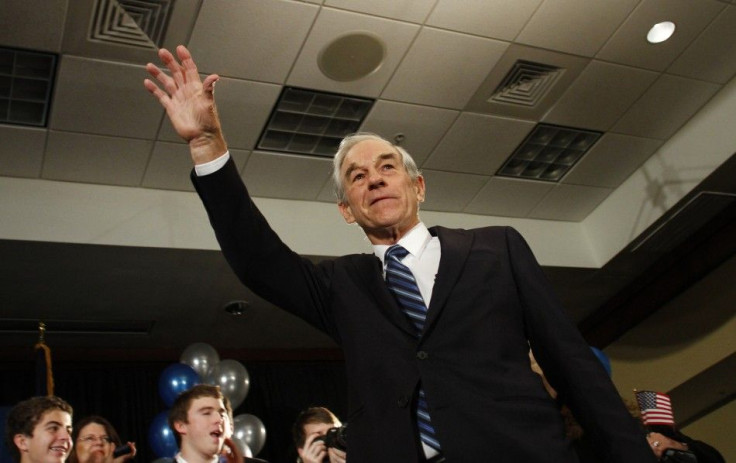Ron Paul in New Hampshire - Does He Have Enough Momentum to Win There?
ANALYSIS

With the Iowa caucuses in the rear-view mirror, does Republican libertarian Ron Paul have his sights set on a third party run?
Paul, who finished third with 21 percent of the vote, behind Mitt Romney and Rick Santorum, who were tied at 25 percent apiece, performed very well, with grassroots support from libertarians, Tea Party members and other conservatives.
Paul's limited government, civil liberties, neo-isolationism-bring-the-troops-home posture struck a chord with Iowa residents. At minimum, one can argue that Paul finished a close second in the expectations game to Santorum -- i.e. performed much better than expected. At maximum, one can argue that Paul has demonstrated he can rumble with the best candidates in a key state.
In Iowa, Paul Dusted Gingrich, Perry
As an example of the latter, in Iowa Paul substantially beat former House Speaker Newt Gingrich, who garnered only 13 percent of the vote, and Texas Gov. Rick Perry, who received 10 percent.
Romney campaign supporters and backers are trying to reinforce their version of history by arguing that Romney, a moderate, was not expected to do well in conservative Iowa, a Midwestern state where conservative Christian voters are a major block in the Republican Party. For them, 25 percent of the vote in Iowa constitutes a win.
Still, Paul supporters can argue that -- despite the plethora of negative news stories regarding the degree of Paul's involvement with newsletters that published racist, homophobic and conspiratorial content -- the Texas libertarian's message resonates with a substantial percentage of Americans who see either too many big government attempts to solve problems and/or a system that favors multinational corporations (including banks) and big business over small businesses and the typical person.
Or, as political operatives view national politics, Five percent is a fluke, 10 percent can be achieved via a media boost, but at 20 percent -- you and/or your message resonated with a segment of the American electorate.
Iowa Picks Corn, New Hampshire Picks Presidents
The key now is whether Paul can capitalize on his Iowa success to score a victory -- or at least an expectations victory -- in the critical New Hampshire primary. Or, as one old saying has it, Iowa picks corn, New Hampshire picks presidents.
Further, if political science research is any indicator, the determining factors will be next Tuesday's New Hampshire primary and the multiple events on Super Tuesday -- March 6.
In past presidential election years, the winning nomination strategy has been to slam New Hampshire, meaning, first win that primary, and then use the increased name recognition, media coverage, and money to perform strongly on Super Tuesday -- when eight primaries or caucuses will be held this time around -- to clinch the nomination.
To Slam New Hampshire
The New Hampshire primary election is critical in the nomination process for three reasons: 1) its timing, 2) because it is conducted by secret ballot (unlike the Iowa caucus), and 3) because the state is seen as being representative of mainstream America and small-town America. Regarding this latter point, voters in the New England state are believed to constitute a good barometer of what the bulk of the party members in the rest of the nation -- the Midwest, the South, and the Rocky Mountain region -- are thinking.
For this reason, the winner of the New Hampshire primary almost always secures the party's nomination for president.
However, there have been exceptions: The last was in 2008, when then-Sen. Hillary Clinton, D-N.Y., won the New Hampshire primary but lost the Democratic nomination to then-Sen. Barack Obama, D-Ill.
Does Paul Have Big Mo on His Side?
In 1988, then-Vice President George H.W. Bush said he sensed a shift in voter preference that boded well for his November 1988 election, saying he had big mo on his side - mo-mentum.
However, it remains to be seen whether Paul can parlay his Iowa momentum into a strong showing in the crucible that is the New Hampshire primary. Paul has attracted certain young voters and other libertarians who see the marvelous technology of the Internet and other devices combining with expanded government investigation powers to spell grim tidings for personal privacy and liberty.
And Paul's message also is resonating with people who value consistency: Paul has basically maintained his core beliefs and values -- and has chosen to not modify them, regardless of whether those views conflict with the Republican Party's sources of power, or, frankly, how shocking those views may be to modern Americans.
In other words, Paul has demonstrated he can appeal to a segment of the electorate outside of his base, but it remains to seen whether his candidacy and planks represent a big enough tent for a national political party nomination.
For that he will have to attract the mortgages -- typical home owners. And that's what the New Hampshire primary will likely determine.
© Copyright IBTimes 2024. All rights reserved.











